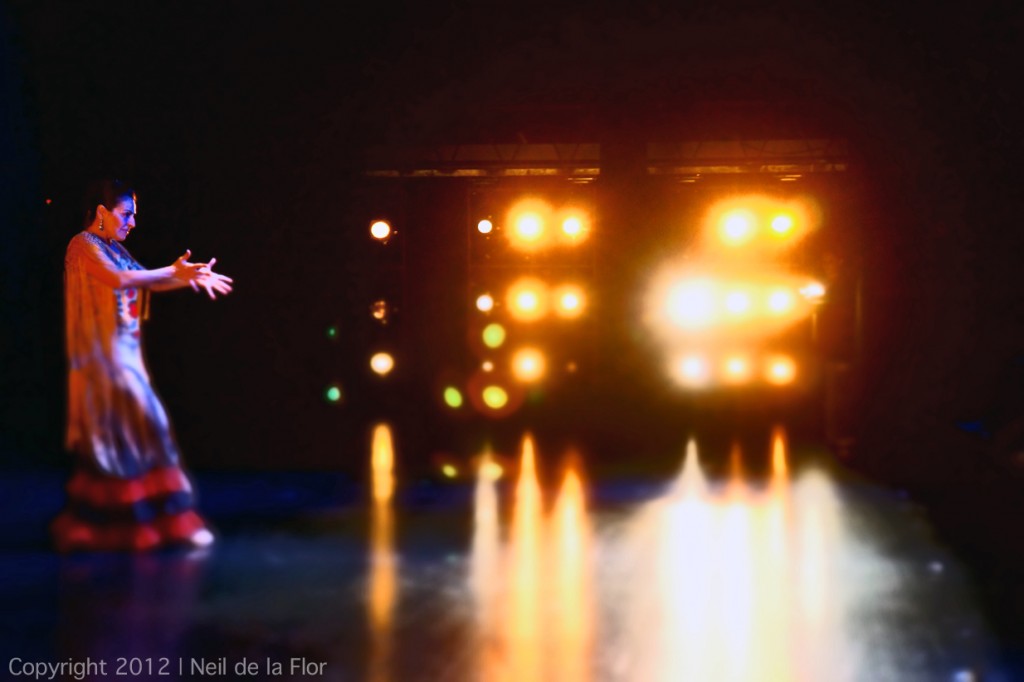
Ana Miranda & Carl Ferrari talkin’ about a revolution/evolution
Art Works for Us presents ”Revolution/Evolution,” an experimental contemporary dance dialogue between flamenco and progressive rock. Created by Artistic Director Ana Miranda and Musical Director Carl Ferrari, “Revoluton/Evolution” opens for one night only on Saturday, September 28th at 8 p.m. The performance features contemporary dance based in Flamenco from Aire Dance Company and live music by the Gypsy Cat Band. Between rehearsals, I spoke with Miranda and Ferrari about the fusion of contemporary dance, flamenco and progressive rock.
Neil de la Flor: Why fuse flamenco & progressive rock? Ana Miranda: First of all, the connection already exists. Years ago, a Spanish friend gave me a recording of Un Encuentro by the ’70s-’80s iconic Andalusian rock group Triana. I played the music incessantly, mesmerized by their sound, a blend of flamenco and rock. I shared their music with Carl, and this became the inspiration for “Revolution/Evolution.” From the point of view of dance/choreography, I was intrigued by the sense of individuality and rebellion that is inherent in both flamenco and rock. These qualities are reflected in my desire to find a personal authenticity within the genre of flamenco, which means including all of my experiences as both American and Hispanic. Flamenco and rock represent parts of me.
Carl Ferrari: As an individual, I am naturally inclined to appreciate connections between seemingly diametrically opposed aesthetics. This explains my desire to fuse things together, which is not without precedent, for if one truly examines the histories of various artistic phenomena, it can be argued that many, if not all, are products of “fusion.” We started with flamenco because of our shared fascination and dedication to the form. Also, an element of our collective histories is the genre of progressive rock, known for combining odd rhythms, exotic harmonies and melodic lines, complex musical forms with shifting dynamics, and interpretations of music from various cultures. The fusion of rock and flamenco came out of Spain, in the genre of Rock Andaluz.
ND: How do you respond to flamenco purists who would gasp at the thought of ‘corrupting’ flamenco in this way? AM: You can’t please everyone, and there will always be people who refuse to accept any variation from their own flamenco. However, facing this resistance and doing the work anyway was part of the artistic process of finding my flamenco. Tradition and experimentation can coexist. Boundary pushing in flamenco is happening worldwide and very aggressively in Spain by top artists in the field. “Revolution/Evolution” is not about corrupting or defiling flamenco. It’s about embracing it fully from the perspective of our cultural experiences as Americans and recognizing it as a global form that reaches outside of its birthplace. Like any other art form, it evolves. This production attempts to decentralize and destabilize the codification of flamenco, not out of corruption, but in order to recapture a freedom of expression that somehow has been lost in the authoritative discourse of what is or isn’t pure flamenco. For the most part, we have had audiences that can get past this discourse and simply experience what is expressed in the work.
CF: Let me begin by saying that people are entitled to their opinion and I welcome anyone’s criticism, especially if it comes from someone I respect and admire. For example, I would be honored if Paco de Lucia thought enough about my music to give an opinion about it good or bad. Saying that there are any rules in flamenco at all seems counterintuitive when considering its association with a group of nomadic people known for living life on the fringes of convention. The reality is that most of the aficionados’ ideas about tradition are based on relatively recent developments in the history of flamenco. For example, the idea of palos (musical structures) is based on recordings of music and performances from within the last 30-40 years. Older references to these palos exhibit a greater degree of variety and down right ambiguity in their parameters. The word “fusion” is probably a more apt description for the development of flamenco than the word traditional. Who is corrupt? Consider what it would be like if The Beatles, their family members and artists from their record label deemed Beatles music as pure rock and anything deviating from their rules an invalid expression of rock music.
ND: What were your challenges putting this work together? AM: Artistically, connecting with a sense of freedom lost within myself in dance. In working with dancers who have more of a contemporary dance background (like Pioneer Winter, Marie Whitman and JoAnna Ursal in this production), I have been able to recapture that sense of freedom and play. Logistically, a production of this kind is challenging, especially in the midst of beginning my MFA in choreography. It’s been a perpetual boot camp, but one with many rewards and pleasures.
CF: Marketing something that truly defies categorization is probably one of the most unique challenges, besides the obvious logistical concerns like funding, finding a venue, rehearsals with a large cast of busy professionals, etc.
ND: What’s next for Ana Miranda and Carl Ferrari? CF: I plan on continuing to seek out high quality venues to present the music of Gypsy Cat, as well as beginning the process of producing our second album.
A.M. I am in MFA land for awhile and fortunately bound to very talented cohorts who are my coaches and partners in evolution. I look at this experience as a journey of personal growth, which includes expanding my artistry. I will continue doing what I love. Freedom and spacious play are on the horizon. Rock on.
“Revolution/Evolution” will be performed for one night only on Saturday, September 28 at 8 p.m. at 7th Circuit Studios, 228 NE 59 St., Miami. Tickets are $25 and are available online at http://www.brownpapertickets.com/event/448574 or at the door.
Recent Content
-
Artsarticle ·
-
Artsarticle ·
-
Artsarticle ·

